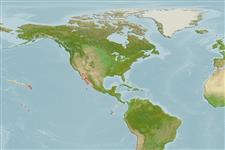分類 / Names
俗名 | 同種異名 | Catalog of Fishes(屬, 種) | ITIS | CoL | WoRMS | Cloffa
Teleostei >
Ovalentaria/misc (Various families in series Ovalentaria)
鱸形目 (Various families in series Ovalentaria) >
Opistognathidae (Jawfishes)
後頜魚科 (Jawfishes)
Etymology: Opistognathus: Greek, opisthe = behind + Greek, gnathos = jaw (Ref. 45335); to the very elongate upper jaw of the type species of the genus, Opistognathus nigromarginatus (Ref. 128653); fossoris: Name from the Latin 'fossorius' meaning adapted to digging.
Environment: milieu / climate zone / depth range / distribution range
生態學
海洋 居於水底的; 深度上下限 12 - 32 m (Ref. 75633).
Eastern Pacific: Mexico.
大小 / 重量 / 年齡
Maturity: Lm ? range ? - ? cm
Max length : 9.4 cm SL 雄魚/尚未辨別雌雄; (Ref. 75633); 9.2 cm SL (female)
簡短描述
檢索表 | 型態特徵 | 形態測量圖
背棘 (總數) : 11 - 12; 背的軟條 (總數) : 15 - 17; 臀棘: 3; 臀鰭軟條: 15 - 17; 脊椎骨: 28. This robust species is of moderate size (4.8-9.4 cm SL) possess the following set of features: upper jaw sexually dimorphic, longer in adult males; a black stripe on the inner lining of maxilla and adjacent membranes; D 15-17, A III; 21-24 gill rakers on lower limb of first arch; multifid nasal cirrus in adults; upper margin of subopercle is extended dorsally as a broad membranous flap; presence of a small black spot at tip of first and second dorsal-fin spines, no ocellated dorsal-fin spot (except in juveniles); body with 6 wide brown bars, usually discontinuous with corresponding markings on dorsal fin, but not below midline; 17 (rarely) or 18 caudal vertebrae (Ref. 75633).
Specimens collected with ichthyocides (Ref. 75633).
Life cycle and mating behavior
成熟度 | 繁殖 | 產卵場 | 卵 | 孕卵數 | 仔魚
Bussing, W.A. and R.J. Lavenberg, 2003. Four new species of eastern tropical Pacific jawfishes (Opistognathus: Opistognathidae). Rev. Biol. Trop. 51(2):529-550. (Ref. 75633)
IUCN 瀕危狀態 (Ref. 130435: Version 2024-1)
無危 (LC) ; Date assessed: 21 May 2007
人類使用
工具
特別的報告
下載 XML
網路資源
Estimates based on models
Preferred temperature (Ref.
123201): 20.6 - 27.7, mean 22.9 °C (based on 14 cells).
Phylogenetic diversity index (Ref.
82804): PD
50 = 0.5000 [Uniqueness, from 0.5 = low to 2.0 = high].
Bayesian length-weight: a=0.00389 (0.00180 - 0.00842), b=3.12 (2.94 - 3.30), in cm total length, based on all LWR estimates for this body shape (Ref.
93245).
營養階層 (Ref.
69278): 3.5 ±0.6 se; based on size and trophs of closest relatives
Fishing Vulnerability (Ref.
59153): Low vulnerability (10 of 100).
